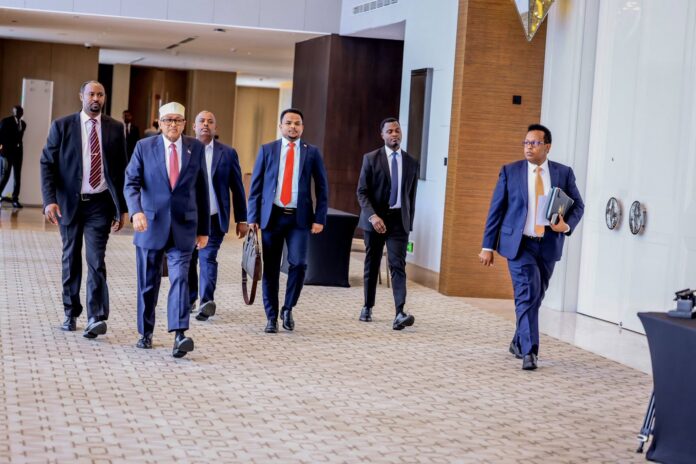HARGEISA (Kaab TV) – Somaliland President Abdirahman Abdillahi Irro is set to travel to Addis Ababa in the coming days for high-level talks with Ethiopian Prime Minister Abiy Ahmed, with the controversial Red Sea Memorandum of Understanding (MoU) topping the agenda.
According to sources within the Somaliland presidency, President Irro is seeking a “first-hand discussion” with PM Abiy on the MoU signed on 1 January 2024 between Ethiopia and Somaliland.
The agreement, signed under former President Muse Bihi Abdi, granted Ethiopia a 50-year lease on a stretch of Somaliland’s coastline on the Gulf of Aden in exchange for potential recognition of Somaliland’s independence — a move that triggered strong opposition from Somalia’s federal government in Mogadishu.
“President Irro is committed to securing Somaliland’s full international recognition — nothing less than that,” an aide to the president, who requested anonymity, told our reporter. “He wants clarity and direct engagement with the Ethiopian leadership before moving forward.”
The MoU, which remains pending implementation, has been a central focus of Irro’s early diplomatic efforts since taking office.
Last month, during a visit to neighbouring Djibouti, Irro held discussions with Ethiopian diplomats led by Kebede Abera Ido, Ethiopia’s Deputy Ambassador to Djibouti.
Their talks covered regional security, Red Sea maritime access, trade corridors, and investment opportunities.
“The President discussed with the Ambassadors the development of the region’s economy, investment opportunities, trade facilitation, infrastructure, and increased humanitarian aid,” said Hussein Aden Ige, spokesperson for the Somaliland presidency, in a May statement.
Deputy Ambassador Kebede confirmed Ethiopia’s interest in deepening cooperation with Somaliland, particularly in areas of trade and security.
Ethiopia, a landlocked nation, has long sought alternative routes for sea access to enhance its import and export capabilities.
In a sign of intensifying international outreach, President Irro also met with foreign diplomats in Nairobi last week, where he reiterated Somaliland’s longstanding call for international recognition.
“We have not come to Nairobi today with a begging bowl,” Irro told the gathering. “We are not looking for handouts. We are here to build genuine partnerships with governments, investors, and institutions that understand the value of mutual benefit.”
Among many Somalilanders, hopes remain high that Ethiopia’s engagement could be a breakthrough toward international recognition, a goal that has eluded the self-declared republic since its separation from Somalia in 1991.
Irro’s administration appears determined to capitalise on this momentum, even amid diplomatic tensions with Mogadishu.


